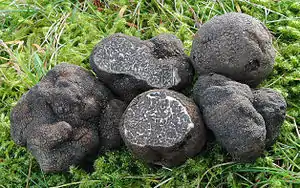| Tuber macrosporum | |
|---|---|
 | |
| Scientific classification | |
| Domain: | Eukaryota |
| Kingdom: | Fungi |
| Division: | Ascomycota |
| Class: | Pezizomycetes |
| Order: | Pezizales |
| Family: | Tuberaceae |
| Genus: | Tuber |
| Species: | T. macrosporum |
| Binomial name | |
| Tuber macrosporum Vittad. (1831) | |
Tuber macrosporum, commonly known as the smooth black truffle,[1] is a species of edible truffle in the family Tuberaceae. Found in Europe, and common in central Italy, the truffle was described as new to science by Italian mycologist Carlo Vittadini in 1831.[2] The truffles are roughly spherical to irregular in shape, and typically measure 0.5 to 2 centimetres (1⁄4 to 3⁄4 inch) in diameter (rarely are they greater than 5 cm or 2 in). The surface color ranges from reddish brown to rust to blackish. Warts on the fruit body surface are low, so that the truffle appears fairly smooth. The truffle flesh is purplish brown to grey-brown with thin white veins.[1] It has an intense garlic-like odor similar to the Italian white truffle (Tuber magnatum).[3] Host plants of T. macrosporum include poplars, hazel, linden, and oaks.[1]
See also
References
- 1 2 3 Hall IR, Brown GM, Zambonelli A (2007). Taming the Truffle: The History, Lore, and Science of the Ultimate Mushroom. Portland, Oregon: Timber Press. pp. 64–67. ISBN 978-0-88192-860-0.
- ↑ Vittadini C. (1831). Monographia Tuberacearum (in Latin). Milan: Ex Typographia F. Rusconi. p. 35.
- ↑ Riousset L, Riousset G, Chevalier G, Bardet M-C, Riousset L, Chevalier G, Riousset G, Bardet M-C (2012). Truffes d'Europe et de Chine (in French). Editions Quae. p. 110. ISBN 978-2-7592-1807-3.